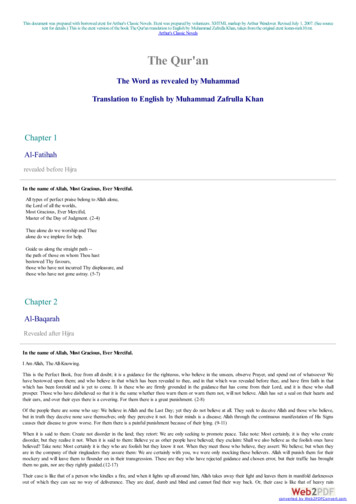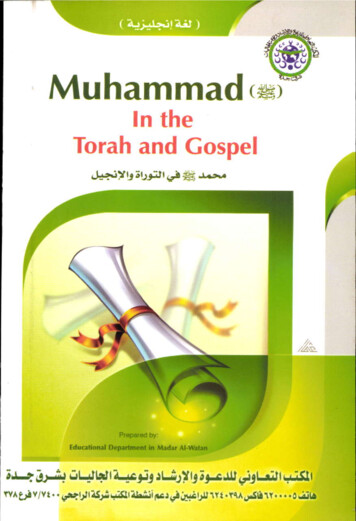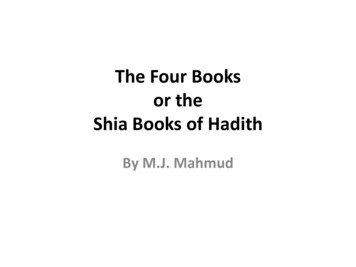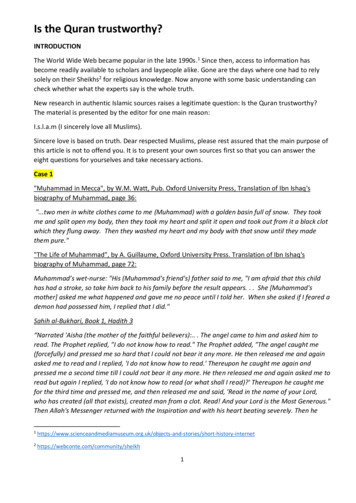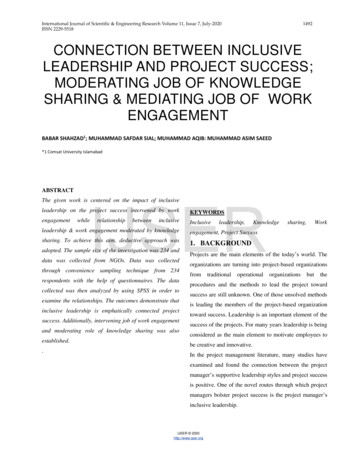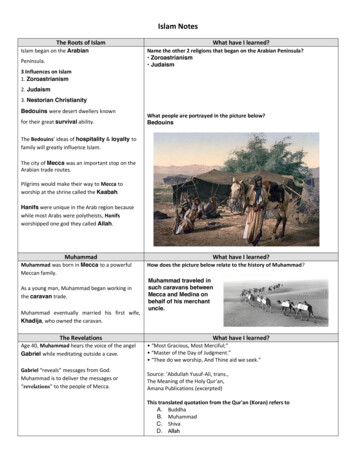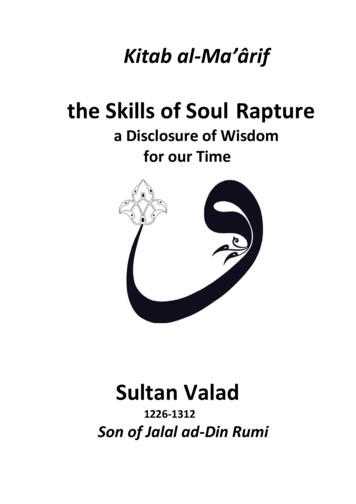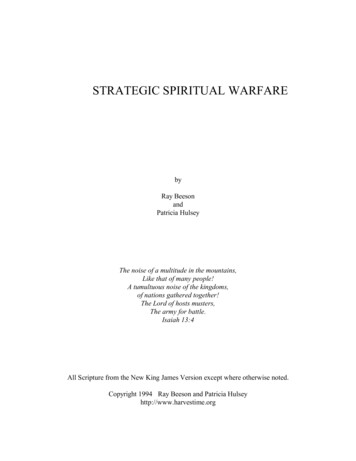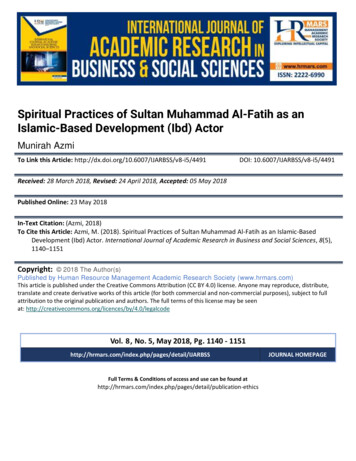
Transcription
Spiritual Practices of Sultan Muhammad Al-Fatih as anIslamic-Based Development (Ibd) ActorMunirah AzmiTo Link this Article: http://dx.doi.org/10.6007/IJARBSS/v8-i5/4491DOI: 10.6007/IJARBSS/v8-i5/4491Received: 28 March 2018, Revised: 24 April 2018, Accepted: 05 May 2018Published Online: 23 May 2018In-Text Citation: (Azmi, 2018)To Cite this Article: Azmi, M. (2018). Spiritual Practices of Sultan Muhammad Al-Fatih as an Islamic-BasedDevelopment (Ibd) Actor. International Journal of Academic Research in Business and Social Sciences, 8(5),1140–1151Copyright: 2018 The Author(s)Published by Human Resource Management Academic Research Society (www.hrmars.com)This article is published under the Creative Commons Attribution (CC BY 4.0) license. Anyone may reproduce, distribute,translate and create derivative works of this article (for both commercial and non-commercial purposes), subject to fullattribution to the original publication and authors. The full terms of this license may be seenat: deVol. 8, No. 5, May 2018, Pg. 1140 - SSFull Terms & Conditions of access and use can be found tion-ethicsJOURNAL HOMEPAGE
International Journal of Academic Research in Business and Social SciencesVol. 8 , No. 5, May 2018, E-ISSN: 2 22 2 -6990 2018 HRMARSSpiritual Practices of Sultan Muhammad Al-Fatih asan Islamic-Based Development (Ibd) ActorMunirah AzmiCentre for Islamic Development Management Studies (ISDEV), Universiti Sains Malaysia (USM)MalaysiaAbstractThis paper aims to study about Sultan Muhammad al-Fatih’s spiritual practices as an Islamicbased development (IBD) actor during his time as Turki Uthmaniah leader. Sultan Muhammad alFatih lead Turki Uthmaniah at young age which is 22 years old. Even though he is a young leader,he and his army team succeed in fulfill hadith Prophet Muhammad SAW about the conquest ofConstantinople which become all previous Islamic leader’s wishes. He also has known with hissteadfast on spiritual practices since his matured (baligh) time though he is responsible withmany commitments as Turki Uthmaniah leader. Therefore, are spiritual practices important inimplement the development and achieve the successful? Three objectives are built in this studywhich is to discover the spiritual practices of Sultan Muhammad al-Fatih, to analyze SultanMuhammad al-Fatih’s spiritual practices on IBD and lastly to summarize Sultan Muhammad alFatih’s spiritual practices on IBD. Document review and content analysis are used for collect andanalyze the data respectively. In a nutshell, this paper found the spiritual practices are importantand give a big impact on the victory and glory in a development. Sultan Muhammad al-Fatih’sspiritual practices are divided into two which is basic spiritual practices and virtue spiritualpractices. These spiritual practices contributed to develop his spiritual aspect which presents hisgood akhlak and personality. Moreover, the involvement of spiritual practices in implementationof development may produce a comprehensive and holistic development which covered allaspect of human lives.Keywords: Spiritual Practices, Islamic-Based Development, IBD actor, Sultan Muhammad al Fatih.IntroductionIslamic-based development (IBD) is using Islamic principle and philosophy in implementing adevelopment. There are seven principles to implement the development in IBD and the secondprinciple from those is human as development actor. The functions of human as developmentactor in IBD are a servant and vicegerent of Allah SWT. These functions are related to relationshipbetween man and Allah SWT, man to man and man to other creation. Thus, to build the goodand ideal man as a leader and development actor, the physical, spiritual and mental development1141
International Journal of Academic Research in Business and Social SciencesVol. 8 , No. 5, May 2018, E-ISSN: 2 22 2 -6990 2018 HRMARSneed to develop in each of human selves. Therefore, researcher chose Sultan Muhammad alFatih as the example of IBD actor who succeed in conquest the Constantinople and fulfill thehadith of Prophet Muhammad SAW which reward him as the best leader among leaders thoughhe is in young age and a beginner in national administrator.Thus, this paper wants to discover Sultan Muhammad al-Fatih’s spiritual practices which build hisideal attitude as IBD actor either as a servant or vicegerent of Allah SWT. Then, analyze andsummarize his spiritual practices on IBD. The researcher divided this paper to five divisions whichis introduction, background of Sultan Muhammad al-Fatih, Sultan Muhammad al-Fatih’s spiritualpractices, analysis of Sultan Muhammad al-Fatih’s spiritual practices as an IBD actor andconclusion for the whole discussion in this paper.Background of Sultan Muhammad al-FatihThe real name of Sultan Muhammad al-Fatih is Muhammad II. He was born on March 29, 1432M at Adrianapolis, Turki. He is a son of Sultan Murad II and Huma Hatun (Maksudoglu, 1999).Sultan Muhammad al-Fatih is the seventh leader of Turki Uthmaniah and he lead TurkiUthmaniah for nearly 30 years. He replaced his father’s throne at young age which is 22 yearsold1 but his experience on govern is not new. He experienced in administration and governmentsince his age is 11 years old (Itzkowitz, 1972). During that time, his father gave responsible to himto govern a region for a while as practical education for him.Sultan Murad II also planned many affairs for Sultan Muhammad al-Fatih to dealing with theenemies either through battlefield or discussion. Sultan Muhammad al-Fatih experienced andlearnt many things during his replacement and he also involved in his father’s battlefield. One ofthe battlefields is the battle for conquest the Constantinople. Unfortunately, the attempts ofconquest do not succeed during his father’s time but he learned some strategies and lessonsfrom that failure to apply during his time (Al-Sallabi, 2016). From those experiences, SultanMuhammad al-Fatih becomes more matured over his age and he has firm target to conquest theConstantinople.Sultan Muhammad al-Fatih was called as “al-Fatih” which means the Conqueror because of hissucceeds in conquering the Constantinople. However, Sultan Murad II also called SultanMuhammad al-Fatih as “al-Fatih” or the Apprentice since his childhood (Rahman, 2013). This is amotivation and a prayer for Sultan Muhammad al-Fatih to achieve the dream of many Islamicleaders which is conquering the city of Constantinople in the future. Sultan Murad II called himas “al-Fatih” and believe his son will achieve that dream because Syeikh Aq Syamsuddin hasinformed Sultan Murad II that the city of Constantinople would be conquered by the Muslimarmy but not during his time (Al-Sallabi, 2016). That moment will come during Sultan Muhammadal-Fatih’s time and he will create a history that cannot be created by other governments laterwhich is conquering the city of Constantinople from the Christian (Rahman, 2013).1Some of scholars said he replaced his father’s throne at 19 years old (USIM, 2010), 20 years old (Islamweb, 2013)and 21 years old (Santri, n.d.).1142
International Journal of Academic Research in Business and Social SciencesVol. 8 , No. 5, May 2018, E-ISSN: 2 22 2 -6990 2018 HRMARSBesides that, Sultan Muhammad al-Fatih took the best education which cover many fields suchas military, religious, academic and government (USIM, 2010). He has learned many skills andknowledge from his home through his parents and scholars, and also from the best educationalinstitute during his time which using Uthmaniah educational system. The Uthmaniah educationalsystem is a strict, earnest, balanced and comprehensive education system that encompassesspiritual and physical education (Rahman, 2013). Most of people in his army team are who’s gottheir education from Uthmaniah educational system.Sultan Muhammad al-Fatih also has many advantages since he was young and he is an excellentscholar who speaks fluently in seven languages which is Arabic, Latin, Greek, Serbian, Turkish,Persian and Hebrew (Rahman, 2013). He also has ideal personalities as IBD actor such as brave,decisive, loving the ‘ulama, often discussing with the ‘ulama on the problems of the state, beingnegligent and inferior (Al-Sallabi, 2016). In addition to his good personalities, Sultan Muhammadal-Fatih was the clever government strategist and led his own army in nearly 25 wars. Hisintelligent on planning the strategies was also respected by Western scholars. During his reign,Turki Uthmaniah became a great empire that resembled the ancient empire which is SultanSulayman’s time in terms of size and power (McCarthy, 1997).Other than that, Sultan Muhammad al-Fatih was a smart person who plans the strategiesintelligently. He studied the failure of strategies from previous leader in attempts to conquest tothe Constantinople in order to form effective strategies during his time. Allah SWT bestowedupon Sultan Muhammad al-Fatih the intelligent mind to think different strategies from previousIslamic leaders so that his army team succeeds in conquest the city of Constantinople(AlSallabi, 2016; Rahman, 2013). Among the strategies of Sultan Muhammad al-Fatih was to createcannons and to mobilize a large number of warships by road. He makes the hill as a road and usesoils and fats to smooth the road so that the ship can be moved easily. The ship's transfer activityis carried out at night and is not realized by the enemy (Al-Sallabi, 2016).Sultan Muhammad al-Fatih died at the age of 49 on May 3, 1481 M for being given poison(Rahman, 2013). He left a will for his son and his successor by emphasizing some of the importantthings. This will directly explain the nature, values and principles which supported by SultanMuhammad al-Fatih throughout his life (Al-Sallabi, 2016).Sultan Muhammad al-Fatih’s Spiritual PracticesAs a development actor, there must be a balance between physical and spiritual aspects in selfdevelopment. Both aspects are important in developing man so that it covered all aspect andman is responsible to implementing comprehensive development. Moreover, spiritual practice isa practice which linking the relationship between man and Allah SWT as the main approach.Salleh (2003) founded the seven principles in Islamic-based development which stated thesecond principle is man as development actor and the third principle is ibadah as IBD framework.There are three categories of ibadah in this framework which is basic ibadah, fadhail al-‘amal(virtues of action) and general ibadah. Basically, basic ibadah and fadhail al-‘amal are referringto spiritual development, while general ibadah for physical and material development (Salleh,1143
International Journal of Academic Research in Business and Social SciencesVol. 8 , No. 5, May 2018, E-ISSN: 2 22 2 -6990 2018 HRMARS2003). The ibadah which involving with spiritual development also include the spiritual practicesin order man could maintain his spiritual aspect.Therefore, one of IBD actors is Sultan Muhammad al-Fatih who is the best leader as mentionedin hadith of Prophet Muhammad SAW2 and he is also one of the greatest men in Islamic history.Sultan Muhammad al-Fatih was very devoted to the religion of Allah SWT and always advising hisarmy team to leave the sins and do not do the things that Allah SWT hate. He believes that AllahSWT will give success to the Muslim army to conquering the city of Constantinople if we followthe Shari’ah and believe to Allah SWT as states in hadith of Prophet Muhammad SAW whichmeans:From Abu Hurairah RA said: Rasulullah SAW said: "Allah SWT says: I according to thesupposition of My servant to Me".(Narrated by Bukhariy, Hadith No.: 7405)Moreover, Sultan Muhammad al-Fatih was known with his continuous spiritual practices eventhough there is too much works and tasks for him to manage. Thus, this paper divided his spiritualpractices to two divisions which found from ibadah as IBD framework. There are basic spiritualpractices and virtue spiritual practices.1)Basic Spiritual PracticesThe focus for basic spiritual practices on this paper are daily spiritual practices which iscompulsory for Sultan Muhammad al-Fatih as IBD actor to do it until he deserves to called as thebest leader. The spiritual practices that Sultan Muhammad al-Fatih never forgets to do since hismatured day were fardu prayer together, rawatib prayer and tahajjud prayer. He also alwaysremembers Allah SWT especially thorough at every night with asking the Almighty to give theglory for Islam faster (Rahman, 2013). These practices never happen at other places instead ofMasjid Jami’ (Mahmud, 2012). Thus, it means Sultan Muhammad al-Fatih do prayer and linkingthe relationship to Allah SWT at the best place which is in mosque, the house of Allah SWT.Besides that, these spiritual practices shown at one of Sultan Muhammad al-Fatih’s famoushistory which is the selection of first Imam at Aya Sofya Mosque after the succeed of conquestthe Constantinople as stated below:“After the success of conquest the Constantinople, Sultan Muhammad al-Fatih find acompatible Imam to lead first Friday prayer at Aya Sofya Mosque. He askedUthmaniah army team to assembly in stand position, and then he asked first question,“Who among all of you never forget to perform fardu prayer since baligh, please sit”.Unsurprisingly, nobody sit down for response to that question. Then, SultanMuhammad al-Fatih asked second question to them, “Who is among all of you neverforget to perform rawatib prayer, please sit”. Half of them sit down and for the lastquestion Sultan Muhammad al-Fatih asked, “Who is among all of you never forget to2Prophet Muhammad SAW said which means: “Verily you shall conquer Constantinople. What a wonderful leaderwill he be, and what a wonderful army will that army be.” (Narrated by Ahmad, Hadith No: 18189).1144
International Journal of Academic Research in Business and Social SciencesVol. 8 , No. 5, May 2018, E-ISSN: 2 22 2 -6990 2018 HRMARSperform tahajjud prayer since his baligh day”. All of the Uthmaniah army team sitdown and only the questioner is left which is Sultan Muhammadal-Fatih himself.”(Al-Sallabi, 2016)This history prove how Sultan Muhammad al-Fatih continuously practice (istiqamat) his spiritualpractices and loyal to Allah SWT. He concerned about his relationship with Allah SWT even thoughhe was burden with too much work and responsibility. Because of his concern, he takes care abouthis spiritual side and also about Uthmaniah army team’s until they deserve to call as the bestleader and army team. Moreover, his spiritual practice which is wake up at night to performtahajjud prayer and munajat has big reward at Hereafter as stated by Allah SWT in adz-Dzariyat(51: 15-18) which means:“Indeed, the righteous will be among gardens and springs, accepting what their Lordhas given them. Indeed, there were before those doers of good. They used to sleepbut little of the night, and in the hours before dawn they would ask forgiveness.”(adz-Dzariyat, 51: 15-18)Otherwise, his istiqamat kind on piety to Allah SWT is encouraged in Islam as stated in hadithProphet Muhammad SAW which means:From Abu ‘Amru and he said Abu ‘Amrah, Sufyan bin ‘Abdullah ats-Tsaqafi r.a said: “Iasked, “O Messenger! Please say to me a word about Islam, where I didn’t ask anyoneexcept to you”. Prophet Muhammad SAW said: “Say! I’m piety to Allah SWT and youneed to istiqamat with it”.(Narrated by Muslim, Hadith No.: 38)In addition, an-Nawawi (2013) said this prayer practices are important on each of human selvesbecause prayer is a pillar which stand on it is a religion. Prayers also hold the religion’s almightyand shows what religion is with giving the actor a medium to closer himself to Allah SWT.However, there are other spiritual practices of Sultan Muhammad al-Fatih in order to take carefirmly his relationship with Allah SWT.2)Virtue Spiritual PracticesVirtue spiritual practices were the practices that Sultan Muhammad al-Fatih chose to do duringsome hard time and most of them he continuous practices it. These practices are nawafilpractices which mean not compulsory practices and it is encourage to Muslim to practice it.Moreover, these practices are more love by Allah SWT instead of the fardu practices becausethese practices are choice for Muslim to practice it and it depends on their piety to Allah SWT. Itis stated in hadith from Prophet Muhammad SAW which means:From Abu Hurairah r.a said, the Messenger SAW said: “Verily, Allah SWT says:“Whoever is hostile to My saints, indeed I declare war on him. And no servant closesto Me for something more I love but with whomever I have frowned upon, My servantcontinues to close to Me by doing the deeds of nawafil until I love him. When I lovehim, I will be his hearing with which he hears, I am his vision with what he sees andhis hand with which he holds and his feet with where he goes. And if he asks from Me,I will bestow it and if he asks for protection from Me, I will protect him. Not I hesitate1145
International Journal of Academic Research in Business and Social SciencesVol. 8 , No. 5, May 2018, E-ISSN: 2 22 2 -6990 2018 HRMARSabout something while I am the Creator, My doubts on a self-righteous servant whohate the death and I hate his evil.”(Narrated by Bukhariy, Hadith No.: 6137)An-Nawawi (2013) said who practice fardu practices3 and in same time he is struggling his energyand time to do sunat practices, he as the servant of Allah SWT may get taqarrub (nearest) andtahabbub (lovely) with Allah SWT. If a development actor can get His love, a great reward willgive to him (Ibid, 2013). Thus, this general spiritual practice is additional practices in order to firmman’s belief to Allah SWT.Sultan Muhammad al-Fatih also didn’t enough with fardu practices only. He always upgraded andimproved his piety with virtue spiritual practices such as believe Allah SWT would give glory tohis team and Islam itself through the conquest of Constantinople (Al-Sallabi, 2016). He also gaveadvice to his army team in order all of them leave sins and tawakkal to Allah SWT so that theglory will come to them. Besides that, Sultan Muhammad al-Fatih asked his teacher, Syeikh AqSyamsuddin a special pray to get taufiq from Allah SWT in order to increase his taqwa level (AlSallabi, 2016). His team also needs to recite the Qur’an and his teacher himself munajat to AllahSWT during the conquest of Constantinople battlefield. An-Nawawi (2013) also said spiritualpractices are the link with blessing from Allah SWT become wasilat to make someone enter theJannah in Hereafter later. It means, spiritual practices not only give happiness in this world but italso give happiness in Hereafter to those who get His love.Spiritual Practices ofSultan Muhammad alFatihVirtue SpiritualPracticesBasic Spiritual PracticesFardu prayerRawatib prayerTahajjud prayerRemembering AllahSWT (munajat)Believe firmly andtawakkal to Allah SWTSpecial prayOften recite the Qur’anLeave sins and munkarpracticesFigure 1. Spiritual Practices of Sultan Muhammad al-Fatih as IBD ActorFigure 1 shows the summary of Sultan Muhammad al-Fatih’s spiritual practices as IBD actorduring his time as khalifah in Turki Uthmaniah. These spiritual practices may follow by IBD actorthis time in order to build good character in them. There are two categories of spiritual practiceswhich is basic spiritual practices and virtue spiritual practices. Basic spiritual practices are thepractices he never forgets to do it such as fardu prayer, rawatib prayer, tahajjud prayer and3The fardu practices not only complete five Islamic pillars but leave munkar deeds and sins also involvedNawawi, 2013).(An-1146
International Journal of Academic Research in Business and Social SciencesVol. 8 , No. 5, May 2018, E-ISSN: 2 22 2 -6990 2018 HRMARSremembering Allah SWT (munajat). Meanwhile, virtue spiritual practices are additional practicesand individual choice to do it in order to make relationship with Allah SWT firmly such as believeand tawakkal to Allah SWT that the glory for Islam will coming soon, special pray to get taufiqfrom Allah SWT for increasing his taqwa level, always recite the Qur’an, leave the sins and munkardeeds.Analysis of Sultan Muhammad al-Fatih’s Spiritual Practices as an IBD ActorAs an IBD actor, there are two functions as mentioned earlier which is a servant and vicegerentof Allah SWT. To fulfill these functions, IBD actor need to maintain his spiritual and physicalaspects equally and in same time, his akhlak and personality must be good in order he becomeas role model to others. Sultan Muhammad al-Fatih as the subject to focussed in this study asIBD actor has good akhlak and personality so that he became role model for his people generallyand for Muslim specifically. Through his spiritual activities, he can maintain the spiritual aspecton himself and automatically the physical aspect will be shown good akhlak and personalitywhich reflected from his good heart (pure soul). His good akhlak developed from his goodspiritual aspect which affected his good personality and his action too.One of functions as IBD actor is servant of Allah SWT. Al-Qaradhawiy (2007) has listed excellentpersonalities as servant Allah SWT from al-Furqan (25: 63-77) which is tawadu’, generous,perform night prayer, fear to hell punishment, moderate in spending, Tawhidic, not kill othersand respect other creation, stay away from adultery and avoid sins, do real repentance, nottaking false oaths and continuing do disadvantage things, understand Qur’anic verses, and lastlypray good things for wife and family. Those excellent personalities also a part from IBD actor’sspiritual aspect because IBD applied ibadah as approach in implement the development (Salleh,2003). There are three types of ibadah (basic ibadah, fadhail al-‘amal and general ibadah) andall of those are linking to each other and need on implementing the development.IBD actor also has function as vicegerent to Allah SWT and they are responsible to lead peopleand present the good example to others. As a vicegerent to Allah SWT, al-Farabi (1985) has listedthe quality of a khalifah which is has physical strength and not easy to get any disease,understand message and deliver it easily, has sharp mind for remember all important things,highest level of knowledge, brave in speak truly, always seeking knowledge and upgrading hisknowledge to be better, love the truth and hate the fraud, not eager to foods, drinks and sexualintercourse, proud and respect to what he belief, not concern too much to world properties,justice and within people who just, firm with his philosophy and not easy to be scared to othersand not has weak thinking.Thus, the excellent personalities of servant Allah SWT and the qualities of vicegerent Allah SWTalso have been applied in Sultan Muhammad al-Fatih’s life. Sultan Muhammad al-Fatih was goodin maintaining his three type of relationships which is relationship with Allah SWT, relationshipbetween man and relationship with other creations. He also becomes the role model to othersas a good khalifah Allah SWT without differentiate his people’s religion, races and ancestry. Thepersonality and self-quality of Sultan Muhammad al-Fatih as IBD actor can be seen on Table 1:1147
International Journal of Academic Research in Business and Social SciencesVol. 8 , No. 5, May 2018, E-ISSN: 2 22 2 -6990 2018 HRMARSTable 1. Personality and Self-Quality of Sultan Muhammad al-FatihPersonality and SelfNo.History of Sultan Muhammad al-FatihQuality of IBD Actor1 Tawadu’ and humble- Sultan Muhammad al-Fatih is very humble person. He is notignorant and proud with what he has such as the intelligentmind, the wide of his district and the crowded of his armyteam (Al-Sallabi, 2016).2 Perform night prayer- Sultan Muhammad al-Fatih never forget to perform tahajjudprayer since he is baligh. This can be prove when theselection of first Imam at Aya Sofya Mosque after succeedon conquest the Constantinople (Al-Sallabi, 2016; Rahman,2013; USIM, 2010; Santri, n.d.).3 Fear to hell- Sultan Muhammad al-Fatih giving advice to his people topunishmentleave the sins and fear to Allah SWT’s punishment. He alsoleft this advice on his will to his successor (Al-Sallabi, 2016).No.45678Personality and SelfQuality of IBD ActorTawhidic and fear toAllah SWT onlyHistory of Sultan Muhammad al-Fatih- The Uthmaniah army team control the war to conquest thecity of Constantinople accompanied by tahlil and takbirshouts as well as pray to Allah SWT for the glory of Islam (AlSallabi, 2016).Avoid the adultery and - Sultan Muhammad al-Fatih advised to his army teamleave the sinsincluding himself to avoid adultery and abstain from evils(Rahman, 2013). It is because, the glory of Islam could beachieved when all of the Uthmaniah army have pure heartand obey to Allah SWT.Understanding Quranic - Sultan Muhammad al-Fatih studied the Qur’an and succeedversesin memorize the whole Qur’an from al-Maula al-Kurani inthree years (Al-Sallabi, 2016).- Syeikh Aq Syamsuddin also sent letter to Sultan Muhammadal-Fatih that stated on it: “We have tawakkal to Allah SWTand recite the Qur'an” (Al-Sallabi, 2016).Love the truth and hate - Sultan Muhammad al-Fatih was not deceived by thethe fraudpersuasion of the enemy leader who offered the propertiesto him in order to stop the war. He rejected all of them forthe truth of Islamic supremacy in European lands(AlSallabi, 2016).Healthy body from- Sultan Muhammad al-Fatih has a strong body health and hechronic diseasesis able to participate in many battlefields (Al-Sallabi, 2016).- He did not have any serious illness and his death was not dueto a disease attacks but was due to treason (Rahman, 2013).1148
International Journal of Academic Research in Business and Social SciencesVol. 8 , No. 5, May 2018, E-ISSN: 2 22 2 -6990 2018 HRMARS9Moderate in spending10Intelligent mind11Personality and SelfQuality of IBD ActorKnowledgeable12Brave13Justice14Strict with ownstandingNo.- Sultan Muhammad al-Fatih did not waste in spending and healso advising the officers not to spend too much on stateproperties (Al-Sallabi, 2016).- Sultan Muhammad al-Fatih prepares to conquest theConstantinople neatly. He sought information about thatcity and investigated the strength of the city’s fortress andprovided maps for his army team (Rahman, 2013). He hasbrilliant thinking when he was able to think to transfer thewarships by non-oceans (Rahman, 2013; Al-Sallabi, 2016).History of Sultan Muhammad al-Fatih- Received education from famous scholars in various fieldssuch as Qur’an, hadith, fiqh and modern knowledge likemathematic, history, astronomy and military. He alsomastered in seven languages which is Turks, Arabic, Latin,Greek, Serbian, Persian and Hebrew (Rahman, 2013).- Sultan Muhammad al-Fatih went to battlefields for fightagainst the enemies with his own sword. He called his armyteam to become the armies of Allah SWT and stir up thespirit of Islam within them (Al-Sallabi, 2016).- Sultan Muhammad al-Fatih gave religious rights to thePeople of the Book and not to oppose them to practice theirreligion. In fact, he respected the religious leaders (AlSallabi, 2016).- Sultan Muhammad al-Fatih is firm and determined toconquer the Constantinople. He pleaded in advance to theleader of Constantinople at that time. When they rejectedhis application, the war to conquer the city ofConstantinople took place (Al-Sallabi, 2016).- There are also army team who have despaired to conquerthe city of Constantinople but Sultan Muhammad al-Fatihfirmly with his stand and have a strong determination toconquer the city of Constantinople or Shaheed there (AlSallabi, 2016).The personalities and self-qualities in Sultan Muhammad al-Fatih had indicated the reflection ofhis spiritual aspect which built by his strong relationship with Allah SWT through spiritualpractices. From one to seven of those personalities and self-qualities showed Sultan Muhammadal-Fatih’s spiritual aspects and his practices while the rest of those showed the impact from hispractice which is good akhlak. He also spread the goodness to his people and practice together1149
International Journal of Academic Research in Business and Social SciencesVol. 8 , No. 5, May 2018, E-ISSN: 2 22 2 -6990 2018 HRMARSwith them to become the best leader and army team, and fulfilled the hadith from ProphetMuhammad SAW indirectly.Therefore, IBD actor need to apply these spiritual practices in order to build a good developmentactor and attain the glory for Islam again. Even though Sultan Muhammad’ responsibility isincreasing, he maintaining his relationship with Allah SWT and implement better developmentfor his people. The strength of spiritual practices in IBD actor’s self also will build thecomprehensive and holistic development. The community also will live in harmony and happilysurrounding.ConclusionSpiritual practices are important to develop human selves especially for IBD actor. It is becausethey are responsible to implement the development and the fundamental of development mustbe involving the spiritual aspect which is improving based on the spiritual practices. Two divisionsof spiritual practices which is the basic and virtue that Sultan Muhammad al-Fatih has practicedneed to take thoroughly by every IBD actor. Sultan Muhammad al-Fatih’s personality as a goodkhalifah and in same time, he is a good servant to Allah SWT need to be followed by other leadersso that the good development consists of comprehensive and holistic development may be built.AcknowledgementThis paper was presented at the 12th ISDEV International Graduate Workshop (INGRAW2017)organized by Centre for Islamic Development Studies (ISDEV), Universiti Sains Malaysia (USM),Penang on December 12-13, 2017 in Penang, Malaysia. The author would like to express herdeepest gratitude to he
The real name of Sultan Muhammad al-Fatih is Muhammad II. He was born on March 29, 1432 M at Adrianapolis, Turki. He is a son of Sultan Murad II and Huma Hatun (Maksudoglu, 1999). Sultan Muhammad al-Fatih is the seventh leader of Turki Uthmaniah and he lead Turki Uthmaniah for nearly 30 years.

